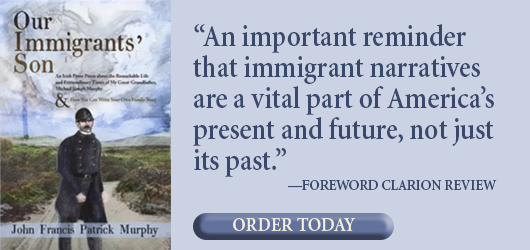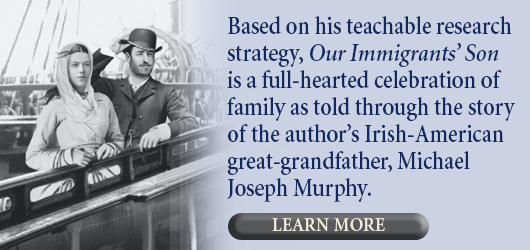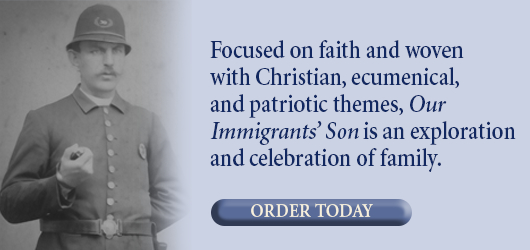It looks like you've stumbled upon a page meant to be read by our code instead of viewed directly. You're probably looking for this page.
Reviewer Eileen Gonzalez Interviews John Murphy, Author of Our Immigrants’ Son: An Irish Prose Poem About the Remarkable Life and Extraordinary Times of My Great-Grandfather Michael Joseph Murphy, & How You Can Write Your Own Family Story
Every one of us comes from somewhere, like it or not, and most of us can’t help but be curious about our origins and ancestors. We want to know the whos, whens, and wheres of our story as far back in the mist of history as possible.
John Murphy’s keen interest in his Irish family launched him on an extraordinary journey of research and creativity—culminating in Our Immigrant’s Son, a family chronicle unlike any other. Indeed, you can’t do better than John’s subtitle to describe the book’s uniqueness: An Irish Prose Poem About the Remarkable Life and Extraordinary Times of My Great-Grandfather Michael Joseph Murphy, & How You Can Write Your Own Family Story.
After reading the Clarion four star review by Eileen Gonzalez, we wanted to learn more about how this project came together, so we put reviewer and author together for this engaging conversation.
Eileen, take it from here.
You’ve spent a lot of time researching your family history. When did you first take an interest in your personal genealogy? And was there an “aha” moment when simple curiosity turned into the need to preserve your history for future generations?
Ever since I was a child I had a strong interest about my family’s history. I would ask my paternal grandfather many question about his father and mother (Michael Murphy and Annie Murphy) and his grandparents (Patrick Murphy and Mary Murphy). My family was blessed with being pack rats so I had many photos, records, and heirlooms to explore. But it wasn’t until my mid-fifties that the idea of writing my family history became a serious thought. As I have gotten older I also began to appreciate that time was ticking and if the writing of my family’s story was going to get done I would be the one to do it.
As I say in Part 2 of my book, I first wrote a poem—a prose poem—about my great great grandparent’s decision to leave Ireland forever and travel to America. Then I had the prose poem translated into the Irish language and then I audio recorded the poem in both languages by a voiceover artist. That poem is Chapter 1 in my book. I then began—chapter by chapter—to write the rest of the book. I looked at each chapter as a separate project—each a discrete project—so when I completed each chapter I felt I was making real progress. I encourage others to use my approach for their story. See Part 2 of my book.
So, there was no a-ha moment—it was a life-long journey. I think as we get older our history becomes more and more interesting and important to us. Perhaps that is related to our growing sense of mortality. And we know the clock of life is always ticking. That, along with my discrete projects approach guided me to start and then finish the book, brick by brick.
You use prose poetry rather than choosing one or the other. Why did you decide on this blended format as the best way to tell your family’s history?
I wanted to blend historic fiction and prose poetry because it was unique and I had not seen any writing that combined both genres. I also thought both genres leant themselves to my message and that combining them would be interesting for my readers. I included lots of images and documents in the book that are facts (nonfiction) but filled in the unknown gaps with historical fiction—but fiction consistent with the known facts. All of this is then wrapped in poetry.
The whole book is really a poem in the tradition of epics such as the Illiad and Odyssey, although I certainly do not hold myself out as a Homer. Also, because one of my themes is the cyclical nature of life—with repeating issues—I thought a poetic style would help support that approach. Poems often circle back on a theme and that is how I conceived of my family history and my book.
Several times throughout the narrative, you use variations on the phrase “make America great again.” Given the fraught history of that phrase, why did you decide to use it in your book? What does that phrase mean to you?
Great question. Although I never use the full MAGA saying, “Make America Great Again,” I did use phrases such as: “Those who saw these huddled masses—these penniless people departing England’s shores—would never guess that they and their descendants would someday become great Americans.”
My use of “great Americans” throughout the entire book was deliberate and I wanted to capture (or perhaps re-capture) the phrase within the context of our brave immigrants—yesterday and today—and how these “tempest tossed” are those who are truly great. To me the phrase “great Americans” and “making America great” represents the highest ideals of our country found in our founding documents including: the Declaration of Independence, US Constitution, the Emancipation Proclamation, and others.”
So, for me the phrase “great Americans” is focused on our best ideals and not a political slogan. I hope my readers catch my intent and my effort to define it within the amazing immigrant experience.
In reading your book, one gets the sense of history repeating itself. At times, you draw explicit connections by, for instance, pointing out how immigrants to America have always faced prejudice and had to struggle for the chance of a better life. What do you think we should learn from the events, mistakes, and triumphs of America’s past?
I believe history is cyclical and through the ages we see repeated themes: prejudice, political and class power, haves and have nots, grief, loss, joy, success, and accomplishment. I think we should learn that our very best ideals from the past can guide us today, while at the same time we find better answers today to problems as we (hopefully) grow in enlightenment.
The last part of the book explains how others can tell their family stories just like you told yours. You include a lot of great suggestions, such as contacting historical societies or talking with relatives. Sadly, not all of these resources are available to all people. For example, sometimes records are lost or not kept at all, and relatives may speak a different language. What advice would you give to those who wish to honor their ancestors but do not have access to a wide range of resources?
One of the reasons I chose to write this book as historic fiction and not nonfiction is because I wanted to fill in gaps in my story where I did not know the actual facts. For example, I did not know much about my family’s time in New Hampshire, so I studied life in the 1850s in New Hampshire and then imagined the life of my family in this time. I would suggest this approach for those with a dearth of family information. Learn about the time period of your ancestry, the culture they lived in, and the major world events that happened in their time. Then extrapolate—create (indeed, make up) details for your ancestors that are unknown but fully consistent with historic facts in their times. I think all of life is really the combining of nonfiction and fiction in our own minds and lives. I wanted to capture that idea in my book.
Barbara Hodge


